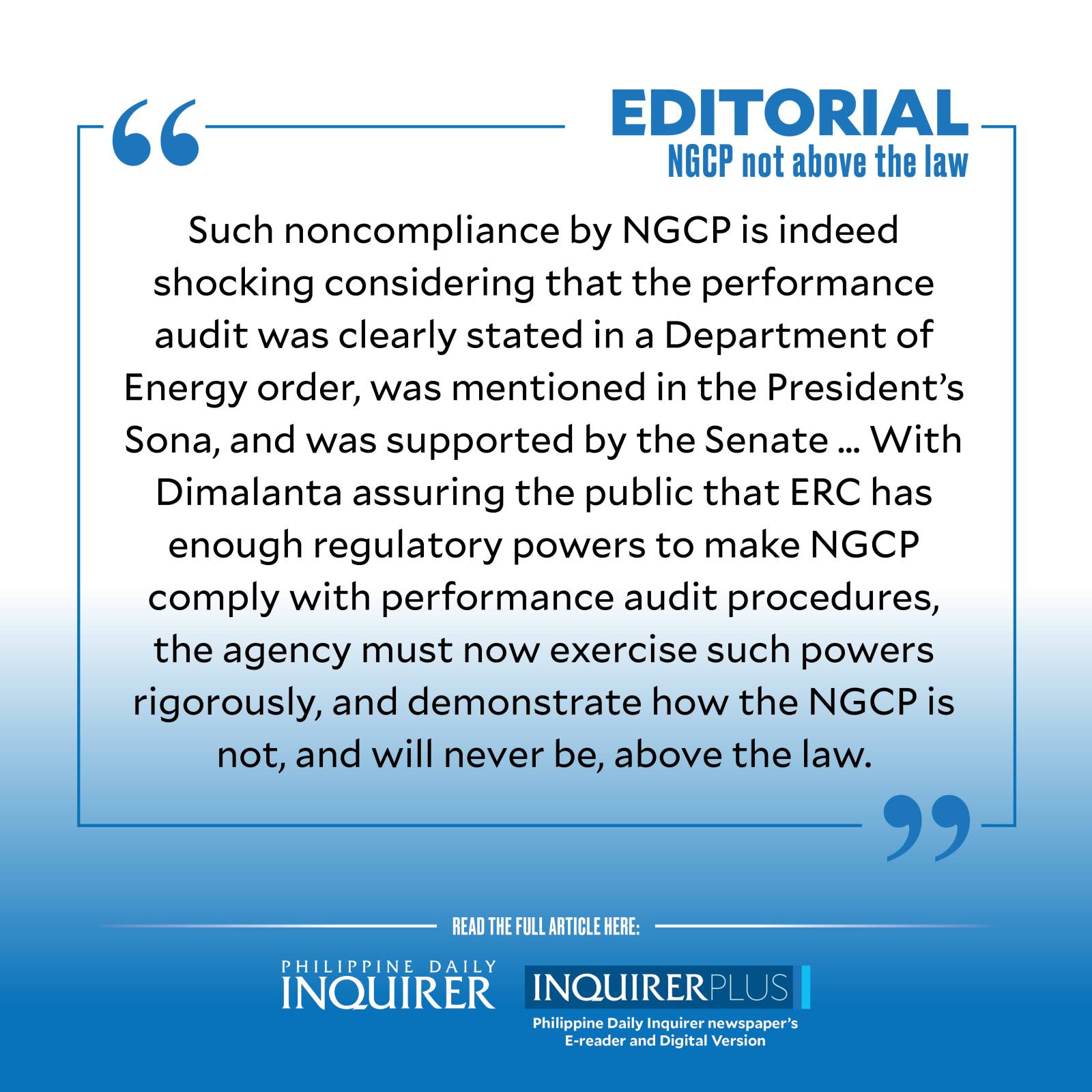
Something’s amiss in the way that privately owned National Grid Corp. of the Philippines (NGCP), the country’s lone power backbone operator, is being regulated. The Energy Regulatory Commission (ERC) is only now initiating a performance audit on the company despite it taking charge of the nationwide electricity transmission network since 2009. And only because President Marcos called for one during his State of the Nation Address (Sona) in July, while the Senate has started looking into mounting complaints against it.
NGCP is 40 percent owned by the State Grid Corp. of China, with the remaining 60-percent stake equally shared by Monte Oro Grid Resources Corp. of tycoon Henry Sy Jr., and Calaca High Power Corp. of businessman Robert Coyiuto Jr. NGCP holds a 25-year concession contract to operate and maintain the transmission system of the state-owned National Transmission Corp.
awarded by the Power Sector Assets and Liabilities Management Corp. (PSALM) on Dec. 12, 2007, after it submitted the highest bid of $3.95 billion (about P225 billion at current exchange rates).
In late 2008, Congress issued NGCP a franchise to operate and maintain the transmission system. PSALM formally turned over the concession to NGCP on Jan. 14, 2009. In the 14 years that NGCP operated the power grid, the company reported a total income of P306.7 billion, P238.8 billion of which was declared and distributed as profit to its shareholders. While there is nothing wrong in private firms declaring earnings as dividends to owners, failing to deliver on its mandate despite the windfall has raised questions.
In May, Sen. Sherwin Gatchalian filed a resolution seeking an inquiry into the delayed implementation of NGCP projects. The lawmaker noted that only six of its 16 energy projects of national significance, or 37 percent, have reached completion as of March 2023. What made the situation worse, as pointed out by Gatchalian and Sen. Risa Hontiveros, is that the cost of these delayed projects had been passed on to consumers. Hontiveros also expressed concern over China’s role in the country’s power sector through its stake in NGCP. Last week, the senator decried another unsettling issue about the company: From 2009 to 2022, the company passed on to consumers nearly P14 billion in “questionable” expenses, Hontiveros said.
Citing financial documents that NGCP submitted to the Securities and Exchange Commission, she said the company spent P8.7 billion for janitorial and security services, P2.3 billion for public relations and corporate social responsibility activities, P1.67 billion for representation and entertainment, and P1.1 billion for advertising. Why the need for advertising expenses when power transmission is considered a “natural monopoly,” which meant NGCP did not have any competitor for it to spend such amount for promotion, Hontiveros asked. “For 14 years, money was spent for things that did not have a direct connection with [power] transmission services or project developments,” the senator said. “[T]hese expenses were passed on to consumers and we, the Filipino consumers, shouldered and paid for these.”
These should have been noted by the NGCP regulator had the ERC conducted regular audits on the company. But during the Senate hearing late last month on the agency’s proposed budget for 2024, ERC chair Monalisa Dimalanta made a surprising revelation. “We are encountering delays in the [performance] audit, particularly in obtaining information from … the regulated entity [NGCP],” Dimalanta told the Senate finance committee. “We find ourselves in a position where we are constrained to explore other legal remedies to make sure that the information is provided to us,” she said, adding that the ERC was considering legal action to compel NGCP to submit pertinent documents needed for the ongoing comprehensive performance audit.
Such noncompliance by NGCP is indeed shocking considering that the performance audit was clearly stated in a Department of Energy order, was mentioned in the President’s Sona, and was supported by the Senate. In May, NGCP expressed willingness to undergo a performance audit, but only “as long as it is under the regulatory framework we function in, including our concession agreement, our franchise, and all applicable rules and regulations,” NGCP spokesperson Cynthia Perez-Alabanza said.
These restrictions may be what the ERC chief was referring to during the Senate hearing, when she spoke of the agency’s difficulty in getting information from the NGCP. The company has a lot to answer for, Gatchalian said. “Transmission projects are very delayed, and it affects all of us … They already collected from consumers for these [delayed] projects … The performance audit is really necessary,” he said.
With Dimalanta assuring the public that ERC has enough regulatory powers to make NGCP comply with performance audit procedures, the agency must now exercise such powers rigorously, and demonstrate how the NGCP is not, and will never be, above the law.

